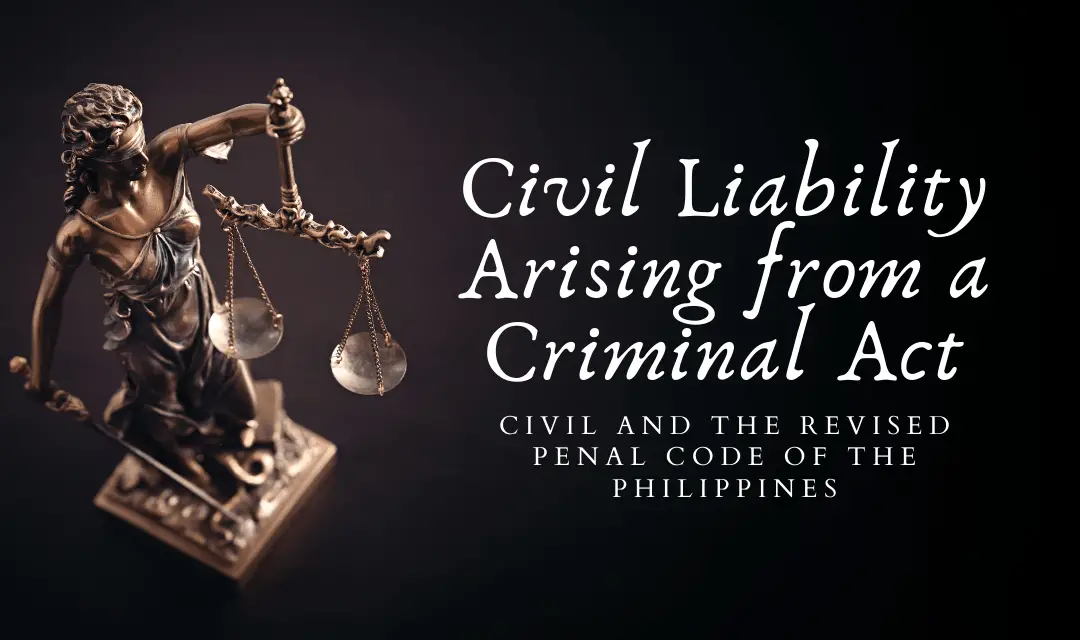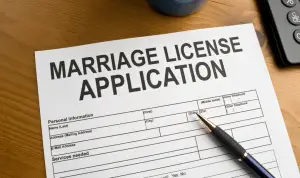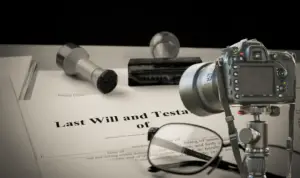What governs the civil obligations arising from criminal offenses?
In our systems of laws, even those who are acquitted by the court for the crimes or felonies for which they are charged, still, they may be accountable in terms of civil damages to make reparations for the supposed victims of the alleged felony committed. In short, even if the guilt of the accused has not been proven beyond reasonable doubt, he can still be made civilly liable.
In Philippine setting, both the Civil Code and the Revised Penal Code shall govern the determination of civil liability arising from a criminal offense.
Can an accused who was acquitted be held civilly liable?
According to Article 29 of the New Civil Code, when the accused in a criminal prosecution is acquitted on the ground that his guilt has not been proved beyond reasonable doubt, a civil action for damages for the same act or omission may be instituted. Such action requires only a preponderance of evidence.
The extinction of the criminal liability does not carry with it that of civil aspect of liability unless the extinction proceeds from a declaration in a final judgment that the fact from which the civil liability might arise did not exist. Criminal liability is harder to prove because it demands proof of guilt beyond reasonable doubt whereas in Civil liability, a mere preponderance of evidence is enough to be civilly liable for an offense.
For instance, Jose was accused of theft, however he was acquitted because his guilt had not been proved beyond reasonable doubt, but it does not mean that Jose will have no liability for the said offense. Maria, the offended party on the other hand, can file an action for damages for the same act and a mere preponderance of evidence is enough to have a cause of action in order for Jose to be civilly liable for the said offense.
Article 29 of the New Civil Code provides that the acquittal of an accused on the ground that his or her guilt was not proven beyond reasonable doubt before the courts of law, does not necessarily mean that he or she is exempted from the civil liability arising from a commission or omission.
In People vs. Ligon [G.R. No. 74041, July 29, 1987], the Supreme Court, quoting the statements made on the Report of the Code Commission, provided that the old rule that the acquittal of the accused in a criminal case also releases him from civil liability is one of the most serious flaws in the Philippine legal system. Furthermore, the Report also stated that there is a difference. One is for the punishment or correction of the offender while the other is for reparation of damages suffered by the aggrieved party.
Who are liable for damages, likewise?
Relative to the discussion of Article 29 of the New Civil Code, Article 33 of the same law provides that the injured party may bring an entirely independent civil action for damages, however, limited only to cases of defamation, fraud, and physical injuries. It must be noted that the term “physical injuries” used by Article 33 should be construed in its broad use, thus, it pertains to any bodily injury, not the crime of physical injury itself. Also, the civil action need not be reserved because the law itself already makes the reservation.
The main purpose of this proviso is to allow individuals to enforce his or her rights in a private action. While the State is the complainant in a criminal case, the private complainant, or complainants, as the case may be, is the one most disturbed for it is the complainant who has suffered directly. Hence, he or she should be allowed to demand reparations for the wrong which peculiarly affect the complainant/s. However, the complainant is not given the right to determine whether the civil action should be scheduled or suspended until the criminal action has been terminated, which results to a sense of independence of the result of the civil action.
Is a person criminally liable also civilly liable?
Civilly liable vs. Criminally liable: In Article 100 of RPC speaks of Civil liability of a person guilty of felony. Every person criminally liable for a felony is also civilly liable. As a general rule, a person committed an offense who is criminally liable is also civilly liable.
If a person who committed an offense is an imbecile, he is exempt in criminal liability. If the offender is insane at the time, he committed the crime, he is likewise exempt from criminal liability. The case or execution of sentence shall be suspended until such time the offender will become sane.
If the offender is a minor fifteen (15) years old below, he is exempted from incurring criminal liability. But if the offender is above fifteen (15) years old but below eighteen (18) and he acted with discernment, he is criminally liable but upon the custody of DSWD to undergo intervention programs.
If the offender is above fifteen (15) years old but below eighteen (18) and he did not act with discernment, he is exempted from criminal liability and upon the custody of the parent, however he is still liable for civil liability but his parents or guardians will be the one civilly liable.
What is Rule 111 of the Rules of Court: Philippine Rules on Prosecution of Civil Actions
Meanwhile, in Rule 111 of the Rules of Criminal Procedure provides for the prosecution of civil action and has seven sections. Among others, they have been the most controversial sections of the Rules and was amended four times.
Section 1 has 2 sub-sections. In sub-section A, it was explained that only the civil liability arising from the offense charged is deemed instituted with the criminal unless the offended party waives the civil action reserves his right to institute it separately or institutes the civil action prior to the criminal action. This only refers to the civil action for the recovery of civil liability arising from the offense charged.
It also must be understood that the reservation of the right to file, any of said civil actions separately waives the others. This does not include civil liability under Articles 32, 33, 34, and 2176 of the Civil Code which could be prosecuted even without reservation.
Also, it tackles the seeking of offended party for civil liability against the accused by way of moral, nominal, temperate, or exemplary damages with or without specifying the amount of the damage in the complaint or information. When it is not specified, the filing fees will be part of first lien on the judgment awarding such damages. But if it is stated in the information, the corresponding fees shall be paid by the offended party, at the same time he will be filing it in the court. And no filing fees is required if for actual damages.
Lastly, any claim which could have been the subject thereof may be litigated in a separate civil action. Therefore, a court trying a criminal case cannot award damages in favor of the accused. Trial courts duty is determining the guilt of the accused and determine possible civil liability, not to determine private complainant’s civil liability.
Sub-section B was made to unclog the court of cases as creditors are using the courts as their collectors. Because ordinarily no filing fee is charged in criminal cases for actual damages, the payee uses the intimidating effect of a criminal charge to collect his credit gratis and after being paid, the trial court is not even informed thereof. This move by the court will significantly lower the number of cases filed and will be expedited due to dishonored checks.
In Section 2, it has been provided that the civil action which has been reserved cannot be instituted until final judgment has been rendered in the criminal action, and if the civil action was filed first before the criminal action, the civil case shall be suspended in whatever stage it may be. But if the criminal case is declared by the court to be dismissed, the civil liability will have no legal ground, and therefore will also be dismissed.
Nevertheless, if the civil action does not arise from a crime, the trial for the civil liability shall continue. But if they arise from the same act, event or transaction, involve the same or like issues, and depend largely or substantially on the same evidence, they shall be tried together by the court. This is to avoid multiplicity of suits and guard against abuse and oppression and prevent delays.
Section 2 also discussed about the extinction of civil liability. Trial for civil liability shall only continue if the acquittal is based on reasonable doubt, the decision contains a declaration that the liability of the accused is not criminal but only civil or the civil liability is not derived from or based on the criminal act of which the accused is acquitted.
In Section 3, The civil action which should be suspended after the institution of the criminal action is that arising from delict and not the civil action based on quasi-delict or culpa aquiliana. Section 4 talks about the general rule that death of the accused after arraignment and during the pendency of the criminal action shall extinguish the civil liability arising from the delict. In the case of People vs Sendaydiego [G.R. No. L-33254 & G.R. No. L-33253 January 20, 1978], though the death of an accused-appellant during the pendency of an appeal extinguished his criminal liability, his civil liability survives. Extinction of criminal liability does not necessarily mean that the civil liability is also extinguished.
In Section 5, while every person criminally liable is also civilly liable, the converse is not true. Extinction of the penal does not carry with it extinction of the civil unless the extinction proceeds from a declaration in a final judgment that the fact from which the civil might arise did not exist.
What is a prejudicial question and what are its requisites?
Section 6 and Section 7 are interconnected. Section 6 talks about suspension by reason of prejudicial question, while Section 7 talks about elements of prejudicial question. Section 7 limits a prejudicial question to a “previously instituted civil action” in order to minimize possible abuses by the subsequent filing of a civil action as an afterthought for the purpose of suspending the criminal action. According to jurisprudence, a prejudicial question involves a similar issue in a civil action which was pending when the criminal action was instituted or before the amendment, in a civil action filed after the institution of the criminal action.
The doctrine of prejudicial question comes into play generally in a situation where civil and criminal actions are pending, and the issues involved in both cases are similar or so closely related that an issue must be pre-emptively resolved in the civil case before the criminal action can proceed. There is no prejudicial question where the outcome of the civil case is not in any way determinative of the guilt or innocence of the respondent in the criminal cases




